
Co-operative planning for climate-change disasters is essential to ensure that communities, institutions, and governments jointly anticipate, prepare for, and respond to climate risks especially those involving displacement, extreme weather, and cascading environmental hazards. Under SDG 13. AASTMT has increasingly stepped into this role, engaging with regional organizations, government bodies, and disaster risk frameworks to ensure its planning is part of broader, coordinated strategies that align with its climate action and resilience policy goals.
The Arab Academy for Science, Technology and Maritime Transport (AASTMT), in collaboration with the League of Arab States, successfully organized an impactful International Forum at the Arab States Pavilion during COP29 in Baku, Azerbaijan. The forum brought together experts, educators, and climate leaders to explore the critical role that educational institutions play in advancing climate change research and building human capacity to address the global climate crisis.
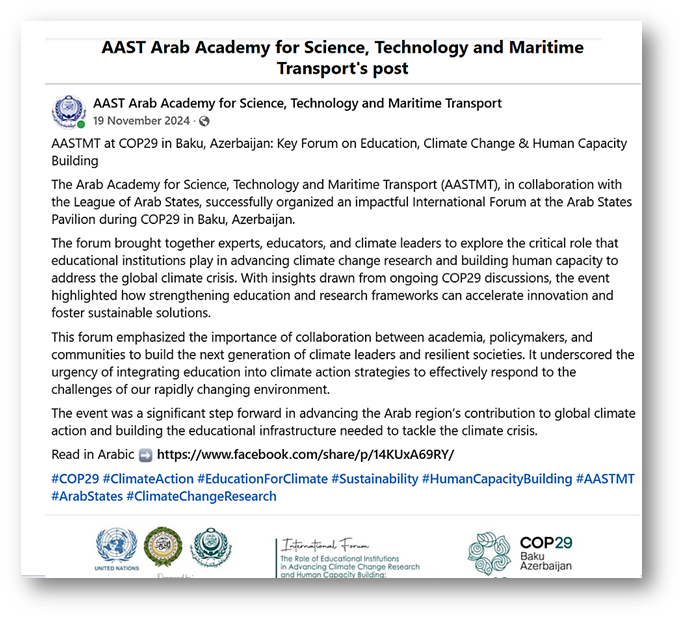
AASTMT co-organized a workshop on March 28, 2024, in cooperation with the Department of Housing & Water Resources and the League of Arab States. This is classic cooperative planning around disaster risk. The event aimed to strengthen national and regional capacities in disaster preparedness and risk management, emphasizing the importance of coordinated planning and inter-institutional cooperation to mitigate the impacts of climate-induced disasters. Through expert presentations, policy discussions, and knowledge exchange, the workshop fostered dialogue between academic institutions, government agencies, and regional organizations to promote resilient infrastructure, sustainable resource management, and proactive disaster risk reduction strategies.
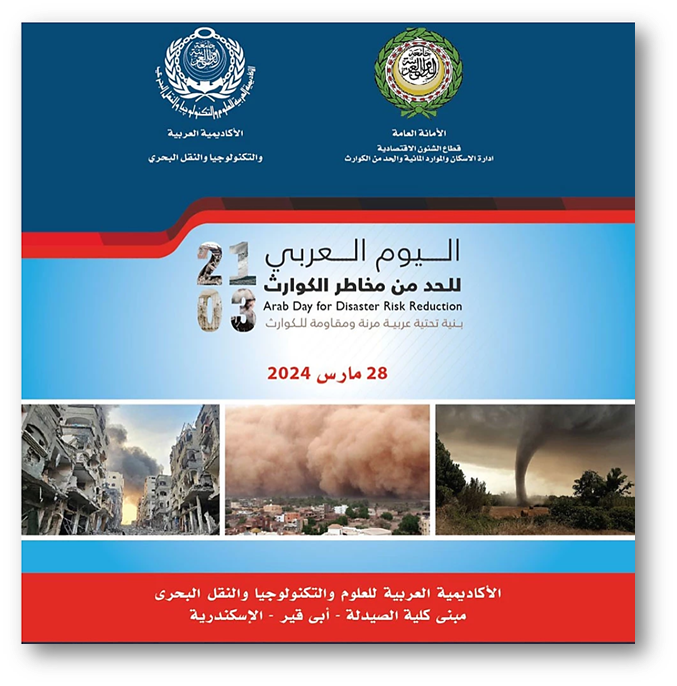
In March 2024, the Arab Academy for Science, Technology and Maritime Transport (AASTMT) hosted the 13th Annual International Maritime Transport and Logistics Conference (MARLOG) under the auspices of the Arab League and in cooperation with Egypt’s Ministry of Transport. During the event, Admiral Osama Rabie, Chairman of the Suez Canal Authority, highlighted the canal’s pioneering efforts in climate action, noting the reduction of 55 million tons of carbon emissions and 17 million tons of fuel savings in 2023 through its “Green Canal 2030” strategy. The initiative emphasizes clean energy use, sustainable maritime transport, and environmentally friendly operations, positioning the Suez Canal as a global model for mitigating greenhouse gas emissions, reducing carbon footprint, and advancing climate change mitigation and adaptation in maritime logistics.
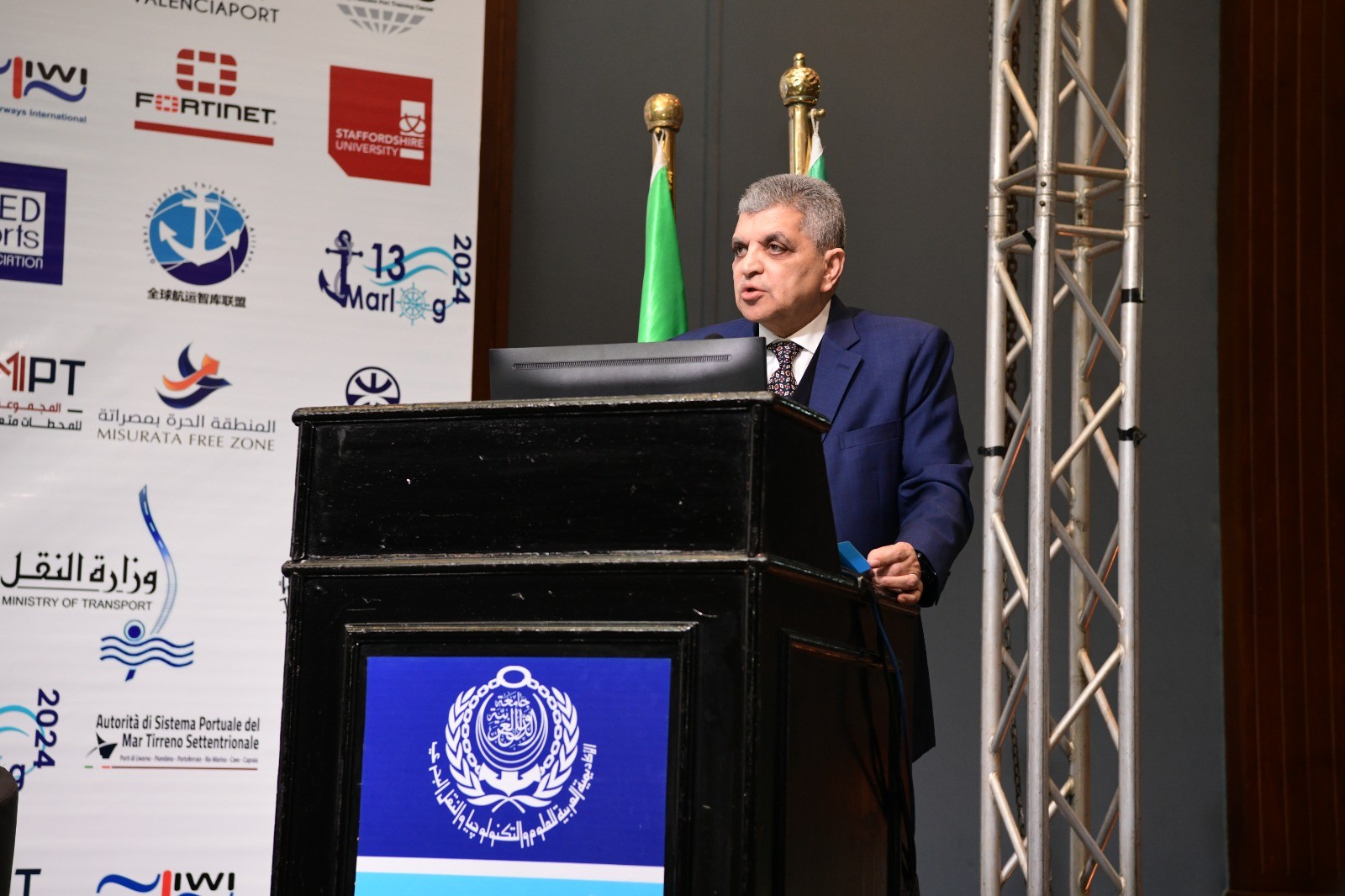
The Arab Academy for Science, Technology & Maritime Transport (AASTMT) took part in the World Cities Day 2024 celebration under the theme “Youth Leading Climate and Local Action for Cities.” The event was held on October 31, 2024 at the Bibliotheca Alexandrina, Alexandria, as part of Egypt’s preparations to host the World Urban Forum (WUF12) in Cairo. More than 1,500 participants — including experts, youth, decision-makers, and international delegates from around 30 countries — attended sessions and interactive activities. High-level officials such as the Egyptian Prime Minister, the Ministers of Local Development, Planning, Youth, and other dignitaries were present.
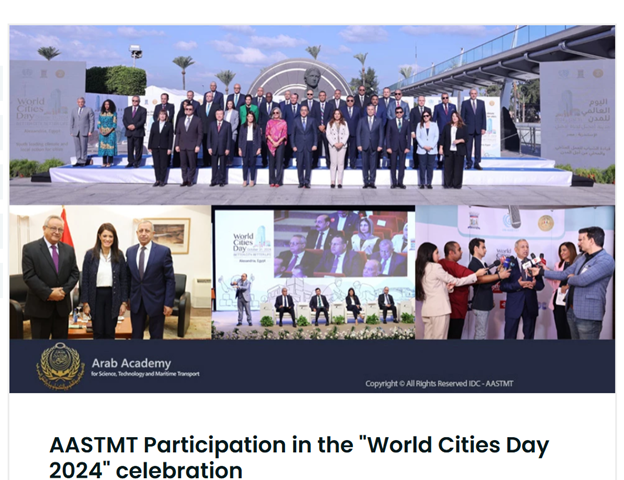
AASTMT launched the first issue of its scientific journal “Multidisciplinary Adaptive Climate Insights (MACI)”, Volume 1, Issue 1. The publication promotes interdisciplinary research and collaboration on climate change mitigation, adaptation, and resilience planning, aligning with SDG 13.3.3 — Co-operative planning for climate change disasters. The journal encourages cooperation among academia, government, industry, and civil society to address complex climate challenges. Articles such as “The Civic University Model as a Living Lab” highlight the role of universities as active partners in community-based climate planning, while studies like “Cold Ironing in Ports” explore emission-reduction strategies that enhance maritime resilience. Through this platform, AASTMT fosters knowledge exchange and multi-stakeholder engagement essential for developing adaptive strategies to reduce climate risks and strengthen institutional coordination in disaster preparedness and response.
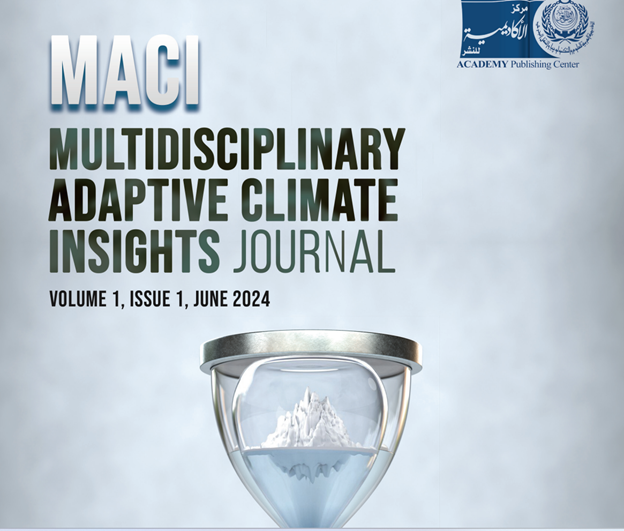
AASTMT was proud to participate in the Egypt Energy Show (EGYPES) a major regional platform dedicated to energy transition, innovation, and sustainable development. Through its participation, AASTMT showcased its commitment to advancing renewable energy, climate action, and technological innovation in alignment with SDG 13 (Climate Action). The Academy’s delegation engaged in discussions with government representatives, industry leaders, and sustainability experts, emphasizing the importance of collaborative planning and capacity building to address climate challenges and promote a low-carbon future. This public engagement highlights AASTMT’s proactive role in shaping national and regional energy policies, fostering environmental stewardship, and supporting the transition toward a sustainable, climate-resilient economy.
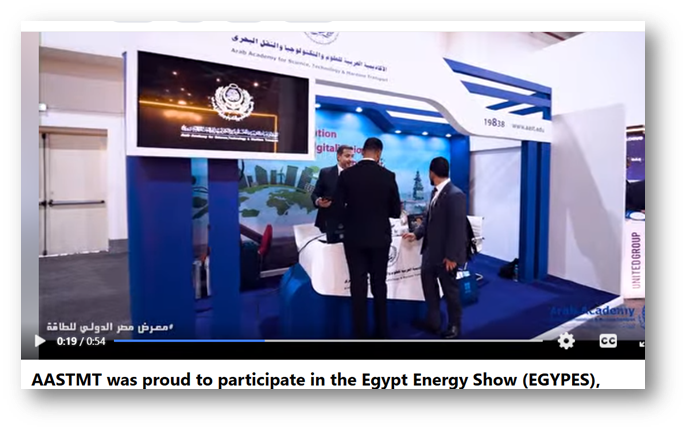
Held under the auspices of H.E. Mr. Ahmed Aboul Gheit, Secretary General of the Arab League, and Prof. Ismail Abdel Ghafar Ismail Farag, President of the Arab Academy for Science, Technology and Maritime Transport (AASTMT), the Sustainable Shipping Forum was organized as part of COP28 UAE. The event focused on the strategic transformation of the maritime industry towards sustainability, emphasizing climate action, emission reduction, and green maritime technologies. The event educated and trained stakeholders in the maritime sector about the need for climate change mitigation and decarbonization strategies. It emphasized green shipping, reducing CO₂ emissions, and energy efficiency, which are key components of climate action capacity building, gathered academics, policymakers, and maritime professionals to share knowledge and technical expertise on sustainable transformation in the industry.
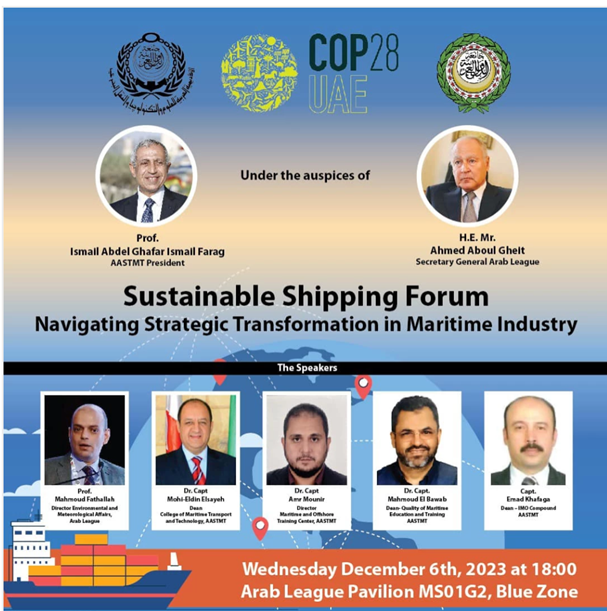
AASTMT actively participates in co-operative planning for climate change disasters, working closely with government bodies, local authorities, and international organizations. By addressing the growing risks of climate change, such as rising CO2 emissions, extreme weather events, and sea-level rise, AASTMT implements strategies for disaster preparedness and climate adaptation. These efforts include infrastructure enhancements, emergency response planning, and sustainable practices to mitigate the impacts of global warming.
Through workshops, forums, and partnerships, AASTMT contributes to solutions for displacement risks, both within and across borders, and fosters collaboration to reduce greenhouse gas emissions while strengthening climate resilience. This proactive approach aligns with the Paris Agreement and emphasizes the university's dedication to global climate sustainability and preparedness.
AASTMT’s co-operative planning ensures its communities and stakeholders are equipped to adapt to climate-induced challenges, reaffirming its commitment to mitigation, adaptation, and long-term climate resilience.
AASTMT’s Crisis Management Course equips participants with skills for co-operative planning for climate change disasters. The course focuses on risk assessment, emergency planning, and disaster response strategies, emphasizing collaboration with local governments and organizations to address climate risks such as flooding, extreme weather, and displacement of people. This initiative aligns with AASTMT’s commitment to climate resilience and CO2 reduction through sustainable disaster preparedness.

AASTMT's specialized training programs aimed at disaster preparedness and climate resilience.
AASTMT participated in an international workshop addressing climate change impacts in the Mediterranean, focusing on co-operative planning for climate disasters. Key discussions included extreme weather events, displacement of people, and the effects of global warming on coastal areas and agriculture. Collaborative strategies were developed to enhance disaster preparedness, risk assessment, and regional resilience. This aligns with AASTMT’s commitment to working with governments and stakeholders to mitigate climate risks and ensure sustainable adaptation.
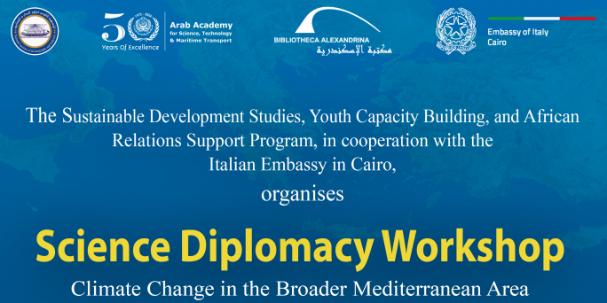
AASTMT’s proactive role in international planning for climate resilience and disaster mitigation.
At COP28, AASTMT co-hosted the Strategic Ocean Alliance Forum, focusing on co-operative planning for climate-induced disasters affecting marine ecosystems and coastal communities. Discussions included extreme weather events, sea level rise, and global warming, emphasizing collaboration between governments and regional stakeholders to strengthen marine resilience and disaster preparedness. This aligns with AASTMT’s active role in integrating science-policy approaches to mitigate climate risks and support vulnerable coastal populations.

AASTMT, in collaboration with the Alexandria Governorate, implemented coastal protection projects to combat sea level rise and strengthen climate resilience. These projects include constructing breakwaters and wave barriers to safeguard vulnerable coastal areas. This initiative demonstrates AASTMT’s active participation in co-operative planning for climate-induced disasters, working with government bodies to protect communities and infrastructure from climate change impacts.

AASTMT actively contributed to ICFSRM 2022, engaging in discussions on climate change, disaster preparedness, and risk management. The conference emphasized co-operative planning for climate disasters, including risk assessment and adaptation strategies for extreme weather events and global warming impacts. By collaborating with experts, government officials, and academics, AASTMT demonstrated its role in fostering partnerships for climate resilience and supporting efforts to address the displacement of people due to climate-related risks.

AASTMT's commitment to collaborative disaster planning in line with its Climate Action Plan.
AASTMT hosted the African Development Senior Managers Forum, focusing on climate change impacts on Africa’s transport infrastructure. Discussions addressed co-operative planning for disaster resilience, highlighting risks such as rising sea levels, extreme weather, and CO2 emissions affecting transport systems. By engaging policymakers and experts, AASTMT advanced strategies to mitigate climate-induced disasters, fostering partnerships to safeguard critical infrastructure and address displacement challenges.

AASTMT’s commitment to collaborative disaster planning with government and regional stakeholders.
AASTMT welcomed the Arab Union for Sustainable Development and Environment (AUSDE) to its AbuKir campus to advance co-operative planning for climate resilience across the Arab region. Discussions focused on climate change adaptation, mitigation strategies, and collaboration on climate-induced disaster preparedness, emphasizing partnerships with governments and organizations to address global climate risks and reduce CO2 emissions.

AASTMT actively participated in Alexandria University's Climate Change and Sustainable Development Forum, fostering co-operative planning for climate disasters through collaboration with academic institutions, government bodies, and local communities. Discussions addressed climate resilience, CO2 emissions reduction, and strategies for managing climate-induced displacement. This initiative highlights AASTMT's commitment to working with stakeholders to enhance disaster preparedness and support vulnerable communities.

AASTMT’s proactive role in advancing regional and national climate adaptation strategies.
AASTMT collaborates with the Egyptian government to implement advanced waste management practices, focusing on climate resilience and emission reduction. By developing 23 sanitary landfills, training over 1,500 local government employees, and introducing global best practices, AASTMT actively contributes to co-operative disaster planning. These efforts reduce CO2 emissions, improve waste treatment systems, and support sustainable practices to mitigate climate-induced challenges.

AASTMT partnered with Egypt’s Ministry of Environment to conduct a specialized training program aimed at enhancing climate resilience through sustainable waste management practices. This initiative provided hands-on training for waste sector staff on maintaining sanitary landfills, reducing CO2 emissions, and mitigating environmental degradation. By aligning with national climate strategies, this collaboration strengthens co-operative disaster planning and equips stakeholders with practical solutions to address climate-related challenges.

AASTMT’s SECCM program equips graduates with advanced skills in climate change management, disaster preparedness, and environmental risk assessment. Through collaboration with international universities, the program focuses on strategies like CO2 reduction, adaptation planning, and greenhouse gas mitigation. Graduates are prepared to engage in co-operative disaster planning with governments and community organizations, contributing to climate resilience efforts and addressing cross-border challenges.

For World Environment Day, AASTMT partnered with the Alexandria Government to implement coastal protection projects addressing sea-level rise and climate-related risks. These efforts included constructing marine barriers and breakwaters, showcasing co-operative disaster planning to protect vulnerable areas. This collaboration demonstrates AASTMT's commitment to climate change adaptation, safeguarding communities, and supporting government-led resilience initiatives.

Details of this collaboration can be accessed through the project documentation.
During World Maritime Day, AASTMT highlighted Port of Damietta's advancements in marine pollution prevention and climate resilience initiatives. By promoting training aligned with international standards, the port equips its staff to address climate-induced challenges such as coastal flooding and the environmental impacts of maritime operations. This collaboration demonstrates AASTMT’s role in co-operative disaster planning with government and industry partners, fostering sustainable practices and protecting vulnerable marine ecosystems.

Details of these efforts are available through the event’s official documentation.
AASTMT collaborated with Egypt’s Ministry of Local Development to advance sustainable waste management in Idku and Badr. The initiative safely disposed of 200,000 tons of historical waste in a sanitary landfill, reducing greenhouse gas emissions and pollution. AASTMT also trained local teams on sustainable landfill operations, enhancing climate resilience and fostering community preparedness for environmental challenges. This initiative showcases AASTMT’s commitment to co-operative planning with government entities to mitigate climate-induced risks.

Detailed documentation can be accessed through the project’s official records.
AASTMT Hosts the African Development Senior Managers Forum on Environmental Management Systems in African Seaports
AASTMT hosted a forum focusing on environmental management systems for African seaports, addressing vulnerabilities such as rising sea levels, marine pollution, and extreme weather events caused by climate change. The event promoted co-operative planning with senior managers, policymakers, and industry leaders to strengthen port infrastructure against climate-induced disasters. Discussions emphasized greenhouse gas reduction, sustainable practices, and resilience-building strategies, highlighting AASTMT’s role in fostering regional collaboration for climate adaptation and disaster preparedness.

Event details are documented in official proceedings.
At COP28, AASTMT showcased its leadership in maritime sustainability and climate disaster preparedness, engaging global stakeholders to address climate change impacts on marine ecosystems and coastal resilience. The discussions emphasized co-operative planning for disaster mitigation, tackling challenges like rising sea levels, extreme weather events, and their effect on global shipping and marine sustainability. AASTMT also highlighted collaborative efforts with governments to integrate climate adaptation strategies into maritime practices, reinforcing its role in building climate resilience across vulnerable regions.
In alignment with Sustainable Development Goal 13 (SDG 13), the Arab Academy for Science, Technology & Maritime Transport (AASTMT) has dedicated significant efforts towards Indicator 13.3.3, which emphasizes cooperative planning for climate change disasters. This includes preparedness for and adaptation to the wide-ranging impacts of climate change, such as the potential displacement of people and the challenges posed to both local and regional infrastructures.
Understanding the complex and multifaceted nature of climate-related challenges, AASTMT has adopted a proactive and collaborative approach. Our initiatives span from academic research and educational programs to practical fieldwork and international cooperation. These efforts are not only aimed at equipping our students and faculty with the knowledge and skills to address climate change but also involve working closely with government bodies, local communities, and international organizations to develop and implement effective strategies for climate resilience.
The following sections outline a series of initiatives and activities undertaken by AASTMT. These include specialized workshops, educational courses, international conferences, and collaborative projects, all designed to foster a deeper understanding of climate change issues and to develop practical solutions. The activities range from local endeavors, such as workshops on energy efficiency and renewable energy, to regional and international collaborations, including participation in global conferences and initiatives like the United Nations Climate Protectors Initiative.
Each of these initiatives reflects AASTMT's commitment to enhancing climate change education and disaster resilience planning at both local and regional levels. By engaging a diverse range of stakeholders and focusing on sustainable and innovative solutions, AASTMT aims to contribute significantly to the global efforts in combating climate change and promoting a sustainable future for all. This includes local and regional initiatives that encompass a wide range of activities from academic courses and conferences to practical fieldwork and international collaborations. Below are some of the key initiatives undertaken by AASTMT:
Additionally, AASTMT has actively participated in all meetings of committees related to climate change, environment, and disaster risk reduction held at the League of Arab States. This involvement exemplifies AASTMT's commitment to regional collaboration and policymaking in climate action. AASTMT's engagement with the League of Arab States committees is a critical component of our broader strategy to address climate change and environmental sustainability at a regional level. Through regular attendance at these meetings, AASTMT has been able to contribute to and stay informed about the latest developments, policies, and initiatives in the realm of climate change and disaster risk reduction across the Arab region. This participation allows AASTMT to align its educational programs, research initiatives, and campus sustainability projects with regional objectives and priorities. It also offers a valuable platform for AASTMT to share its expertise, learn from other members' experiences, and forge partnerships that enhance the effectiveness of our climate action strategies. The collaboration with the League of Arab States reinforces AASTMT’s role as a key player in shaping the region’s response to environmental challenges and in promoting sustainable development across the Arab world.
Dr. Mohamed Mito from the Faculty of Engineering and Technology delivered a lecture on the significance of desalination as a renewable energy source and its role in ensuring water security in Egypt. This initiative aligns with Egypt's hosting of COP27.
Pathway-to-Water-Security- on the AASTMT news page
AASTMT's Productivity and Quality Institute organized a project under the United Nations Office for Disaster Risk Reduction initiative, focusing on building resilience in Egyptian cities against various disasters, including those induced by climate change.
Cities-Resilient-Program-Ismailia- on the AASTMT news page
Continued efforts in the initiative with workshops aimed at enhancing public health sector resilience and city preparedness.
Cities-Resilient-Program- on the AASTMT news page
This visit focused on enhancing energy efficiency and is part of the SEACAP 4SDG 2021-2023 project.
A Visit To The Industrial Technical Secondary School For Drinking Water And Sanitation In Alexandria on the AASTMT news page
This collaboration aimed to discuss joint work for improving energy efficiency within the company.
Visit to Alexandria Water Company on the AASTMT news page
Implemented on 9 Feb 2022, this initiative focused on rationalizing energy consumption and increasing energy efficiency.
AbuKir-Hospital-Development-Plan on the ENI CBCMED web page
Implemented on 9 Feb 2022, this initiative focused on rationalizing energy consumption and increasing energy efficiency.
AbuKir-Hospital-Development-Plan on the ENI CBCMED web page
This joint workshop with the University of Twente and ABB Industries covered topics like power drives, shore supply, and sustainability in marine applications.
Marine Renewable Energy” Workshop on the AASTMT news page
Focusing on sustainable practices in the marine sector, this workshop delved into energy efficiency and renewable energy applications in marine engineering.
Marine-Engineering-Energy-Workshop- on the AASTMT news page
Aimed at promoting environmental awareness and green practices, this workshop contributed to fostering a sustainable mindset among the participants.
Green-Environment-Workshop- on the AASTMT news page
Addressing the growing importance of electric vehicles in sustainable transportation, this workshop explored their potential and challenges.